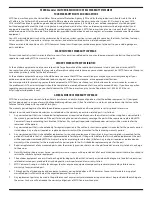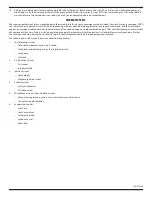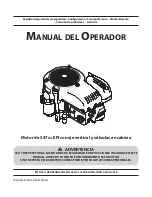
4
S
ection
2 — i
mportant
S
afe
o
peration
p
racticeS
7.
Do not overfill fuel tank. Fill tank to full as indicated by
the fuel level indicator installed inside of the fuel tank or
marked on the tank. Do not over-fill to allow space for fuel
expansion. On some models, a fuel level indicator may NOT
be present, in this instance, fill the tank no more than 1/2
inch below the bottom of the filler neck to allow space for
fuel expansion.
8.
Replace fuel cap and tighten until the cap ratchets.
9.
If gasoline is spilled, wipe it off the engine and the
equipment. Move the machine to another area. Wait five
minutes before starting the engine.
10. To reduce fire hazards, keep the machine free of grass ,
leaves or other debris build up. Clean up oil or fuel spillage
and remove any fuel-soaked debris.
11. Keep gasoline away from sparks, open flames, pilot lights,
heat, and other ignition sources.
12. Never fuel equipment indoors because flammable vapors
will accumulate in the area.
13. Extinguish all cigarettes, cigars, pipes, and other sources of
ignition.
14. Check fuel line, tank, cap, and fittings frequently for cracks
or leaks. Replace if necessary.
Operation
1.
When starting the engine, make sure spark plug, muffler,
and fuel cap are in place.
2.
Do not crank engine with spark plug removed.
3.
If fuel spills, wait until it evaporates before starting engine.
4.
Allow muffler, engine cylinder, and fins to cool before
touching.
5.
Keep children away from hot or running engines. They can
suffer burns from a hot muffler.
6.
Remove accumulated combustibles from muffler and
cylinder area.
7.
Operate equipment with all guards in place.
8.
Keep hands and feet away from rotating parts.
9.
Tie up long hair and remove jewelry.
10. Do not wear loose-fitting clothing, dangling drawstrings or
items that could become caught.
11. When starting the engine, pull cord slowly until resistance
is felt, then pull rapidly (if not electric start).
12. Remove all external equipment/engine loads before
starting engine.
13. Direct coupled equipment components such as, but not
limited to blades, impellers, pulleys, sprockets, etc., must
be securely attached.
Maintenance & Storage
1.
Keep the engine in safe working order
2.
Allow the engine to cool at least five minutes before
storing. Never tamper with safety devices. Check their
proper operation regularly.
3.
Check bolts and screws for proper tightness at frequent
intervals to keep the engine in safe working condition.
Visually inspect the engine for any damage.
4.
Before cleaning, repairing or inspecting; stop the
engine and make certain all moving parts have stopped.
Disconnect the spark plug wire and ground it against the
engine to prevent unintended starting.
5.
Do not change the engine governor settings or over-speed
the engine. The governor controls the maximum safe
operating speed of the engine.
6.
Maintain and replace safety and instruction labels as
necessary.
7.
Always refer to the operator’s manual for important details
if the machine is to be stored for an extended period of
time.
8.
If the fuel tank has to be drained, do this outdoors.
9.
Observe proper disposal laws and regulations for gas, oil,
etc. to protect the environment.
Do not modify engine
To avoid serious injury or death, do not modify engine in any
way. Tampering with the governor setting can lead to a runaway
engine and cause it to operate at unsafe speeds. Never tamper
with factory setting of engine governor.
Notice Regarding Emissions
Engines which are certified to comply with California and federal
EPA emission regulations for SORE (Small Off Road Equipment)
are certified to operate on regular unleaded gasoline, and
may include the following emission control systems: Engine
Modification (EM), Oxidizing Catalyst (OC), Secondary Air
Injection (SAI) and Three Way Catalyst (TWC) if so equipped.
Spark Arrestor
WARNING!
This machine is equipped with an
internal combustion engine and should not be used
on or near any unimproved forest-covered, brush
covered or grass-covered land unless the engine’s
exhaust system is equipped with a spark arrestor
meeting applicable local or state laws (if any).
If a spark arrestor is used, it should be maintained in effective
working order by the operator. In the State of California the
above is required by law (Section 4442 of the California Public
Resources Code). Other states may have similar laws. Federal laws
apply on federal lands.
A spark arrestor for the muffler is available through your
nearest engine authorized service dealer or contact the service
department, P.O. Box 361131 Cleveland, Ohio 44136-0019.





































